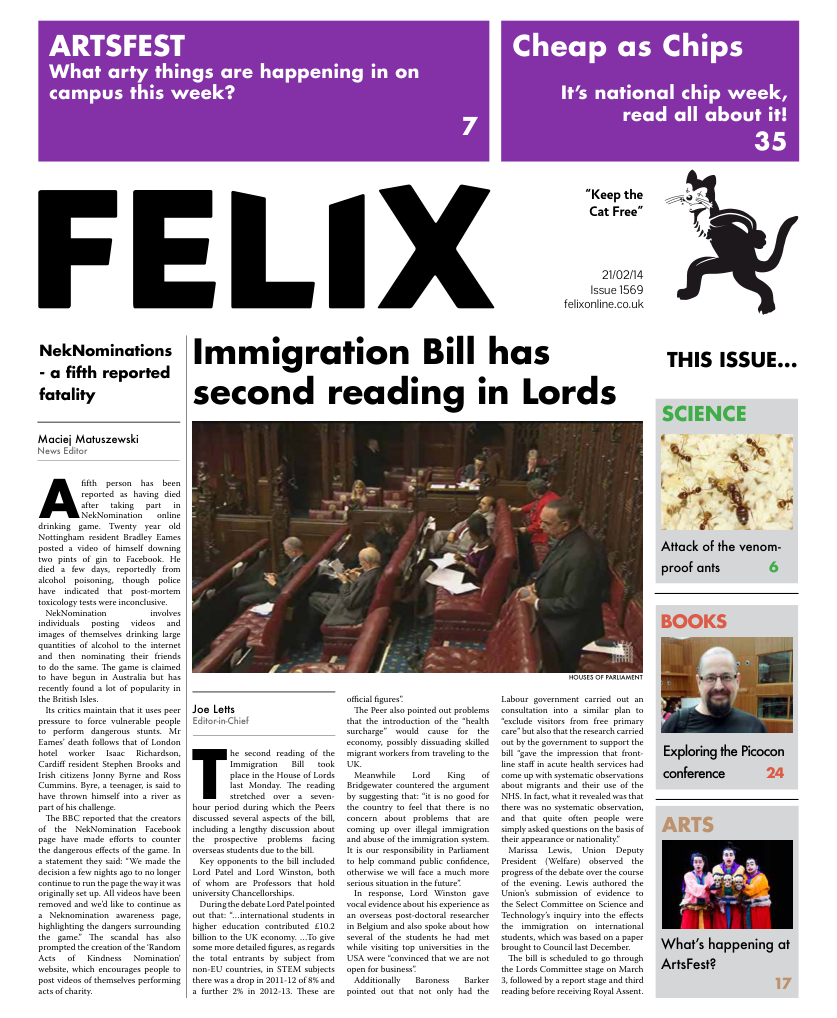Eating Disorder Awareness Week 2014 – It’s Time to Speak Out
Numbers. To the average Imperial student, they are part of everyday academia, to others they are enthralling and engaging, but for some of us they represent a punitive regime by which we live.
Numbers. To the average Imperial student, they are part of everyday academia, to others they are enthralling and engaging, but for some of us they represent a punitive regime by which we live. Numbers are our self-worth, our being, our everything. Kilos, calories, clothes size. Small numbers are our friends, zero is our deity. We are more common than you think: we have eating disorders.
Eating disorders affect approximately 1.6 million people in the UK yet they are still not understood by the masses. Personally, I know of at least 4 people who suffer, or have suffered, from an eating disorder at Imperial, yet there is no support available or awareness on campus. I struggle to understand why this is the case: Imperial is the perfect breeding ground for eating disorders. It is high pressured and competitive; everybody strives to be the best. Everybody wants to be perfect. Personally, I have found this environment triggering and earlier this year found myself in the grips of anorexia once again.
Having an eating disorder is a terrifying and isolating experience no matter who you are. Nonetheless, battling an eating disorder alongside the gruelling workload and intense pressure of College life is inconceivably arduous. I simply could not manage both, something had to give. Studying requires concentration and cognitive clarity. Eating disorders, when unmanaged, abduct this. You become nothing more than a hollow shell consumed by consumption. Fortunately, I was able to identify the downwards spiral in which I was caught and with the support of friends and family I chose to embark on the path to recovery. I felt ashamed; I had come to university three years free of treatment. I thought I was recovered, how did I end up back in entrails of anorexia? It was a place I swore never to be again. I realise now that this doesn’t matter - what matters is that I identified the problem and I am making positive changes. I am tentatively embracing university life once again. I am not recovered by any means, but I am in control.
I wanted to write this article for Eating Disorder Awareness Week not only to raise awareness but to share my story with others who are suffering. To let them know that they are not alone in this, that if they chose it, there is hope, and to share some advice on how to survive at university with an eating disorder. My first piece of advice is to speak out, do not suffer alone. Telling other people is an important step in admitting your struggles to yourself. Moreover, recovering alone is impossible - my friends have helped me so much, without them I’d still be in a very dark place. Secondly, think about what you want from university. Having an eating disorder not only affects your grades but it also engulfs the whole student experience. Do you want to look back and regret wasting ‘the best years of your life’ staying in to avoid calories? My third recommendation is to go to the GP, get professional support. Do not take no for answer. Do not go back when ‘you’ve lost more weight.’ Early intervention is key, let the GP and your demons know your problems are just as serious as anybody else’s. Furthermore, I strongly suggest speaking to your senior or personal tutor: it helps to remove some of the academic pressure.
Finally, make yourself rules. Sensible ones, healthy ones and stick to them. Having a routine makes food more manageable.
The road to recovery is a long one, it is far from smooth, and there are days when giving up is so appealing. At university there is nobody there to make you eat, to stop you from purging or tell you sit down. You have to take responsibility. You have to make positive changes for yourself. You have to recover because you want to, not because you are being forced. Ultimately, you have to take control.





